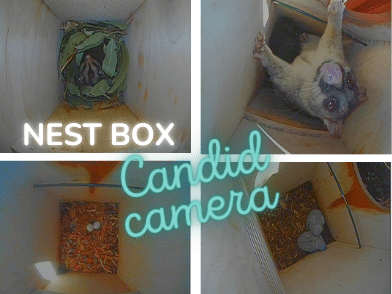With the wintry ‘Ekka westerlies’ on their way, wildlife species are snuggling into the many nest boxes that Queensland Glider Network staff and volunteers have set up in parks and reserves throughout South East Queensland.

Nest box monitors spent three days from 14–16 June checking boxes at Greenbank, near Ipswich. On the second day of inspections, a storm pummelled the region but resulted in a gloriously dew-laden, foggy morning the next day. Image: Wildlife Queensland.
Australia has the highest number of hollow-dependent species in the world. Having evolved side-by-side with eucalypts, which naturally form hollows after a century or more, Australia’s arboreal mammals are heavily reliant on cavities in trees, where they shelter, den and even dine.
Unfortunately, deforestation and degradation of natural habitats have reduced the number of natural tree hollows. Large hollows suitable for greater gliders take even longer to form—up to 300 years.
While land managers are working to revegetate eucalypt woodlands in the long-term, in the short-term, the installation of nest boxes provides gliders, possums, quolls and other and hollow-dwellers with shelter from wind, rain and fog—all of which our nest box monitors encountered while checking boxes in June and July!
Data that delivers
Queensland Glider Network’s ongoing glider project involves regular monitoring of nest boxes to record wildlife occupancy.
Boxes within the Flinders Peak to Karawatha corridor in Logan have been monitored since 2011, providing valuable longitudinal data that enables researchers to understand the distribution and population numbers of hollow-dependent species.
Taking a peek inside

Clockwise from top left: Gliders seen in May were absent in June; predictably, brushtail possums were the most common residents; staff were delighted to see that the two rainbow lorikeet eggs spotted in Cornubia during May inspections had hatched into healthy chicks. Images: Wildlife Queensland.
Checks in the Logan City Council area on 23 June demonstrated the supremacy of brushtail possums when it comes to securing a nest box home. Of the 20 boxes inspected, brushtails occupied half.
Unfortunately, the nest box at Wearing Park that was home to glider species in May was unoccupied during the June inspection, but we hope to see gliders return there soon.
Hollows for hefty gliders
Nest box installation for Australia’s largest gliding mammal, the greater glider, is a little trickier on account of this marsupial’s size.
Wildlife Queensland and the Queensland Glider Network are proud to be working with Logan City Council to raise awareness of greater gliders throughout the local council area and to install more nest boxes.
Already, more than 167 Logan residents have been involved with surveys, nest box installations, workshops, guided spotlight surveys, and an online webinar presented by Dr Teresa Eyre, Principal Ecologist from the Queensland Herbarium.
Residents who attended a guided spotlight survey in Park Ridge were treated to a phenomenal nocturnal spectacle, observing greater gliders, powerful owls (adult and young), squirrel gliders and eastern grey kangaroos.
Logan City Council is also generously sponsoring the production of a detailed brochure that will focus on the plight of Queensland’s gliding mammals and explain how individuals can take meaningful conservation action that will provide real solutions to ongoing problems for gliders.
Visit our What’s on Calendar and subscribe to our free eBulletin to stay informed about upcoming surveys, spotlighting events, webinars or community awareness events relating to Australia’s hollow-dependent marsupials.
